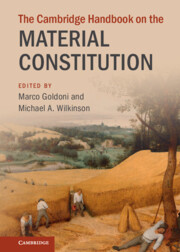Book contents
- The Cambridge Handbook on the Material Constitution
- The Cambridge Handbook on the Material Constitution
- Copyright page
- Contents
- Contributors
- Introduction
- Part I History
- 1 The Tradition of the Material Constitution in Western Marxism
- 2 The Soul of the State
- 3 Laski’s Materialist Analysis of the British Constitution
- 4 Rudolf Smend’s Legacy in German Constitutional Theory
- 5 The Constitution in the Material Sense According to Costantino Mortati
- 6 The Material Constitution of the Dual State
- 7 ‘A Certain Shadowy Totality’
- 8 The Material Constitution in Greek Constitutional Thought
- 9 The Constitution As Social Compromise
- 10 ‘Self-Justifying Law of Constitutional Law’
- Part II Challenges
- Part III Analyses
- Index
7 - ‘A Certain Shadowy Totality’
In Search of the Material Constitution of the United States
from Part I - History
Published online by Cambridge University Press: 15 January 2023
- The Cambridge Handbook on the Material Constitution
- The Cambridge Handbook on the Material Constitution
- Copyright page
- Contents
- Contributors
- Introduction
- Part I History
- 1 The Tradition of the Material Constitution in Western Marxism
- 2 The Soul of the State
- 3 Laski’s Materialist Analysis of the British Constitution
- 4 Rudolf Smend’s Legacy in German Constitutional Theory
- 5 The Constitution in the Material Sense According to Costantino Mortati
- 6 The Material Constitution of the Dual State
- 7 ‘A Certain Shadowy Totality’
- 8 The Material Constitution in Greek Constitutional Thought
- 9 The Constitution As Social Compromise
- 10 ‘Self-Justifying Law of Constitutional Law’
- Part II Challenges
- Part III Analyses
- Index
Summary
Constitutional law features prominently in the political culture of the United States, but there exists no sustained and robust tradition of theorising the material constitution of the polity. Most contemporary constitutional theorists remain committed to what Du Bois referred to as ‘constitutional metaphysics’ in his Black Reconstruction. Instead of attending to historically specific and determinate social relations, such theorists emphasise putative ‘original public meanings’ or an accretive ‘living constitution’. Alternative possibilities for constitutional theory may be identified by reappraising the insights and limitations of older analyses of American constitutionalism by Beard, Llewellyn and Hartz. These possibilities are not premised on the fetishisation of constitutional meaning, on fidelity to the framers’ white supremacist and antidemocratic project or on a commitment to the notion that the constitution is perpetually perfectible.
- Type
- Chapter
- Information
- The Cambridge Handbook on the Material Constitution , pp. 112 - 123Publisher: Cambridge University PressPrint publication year: 2023

